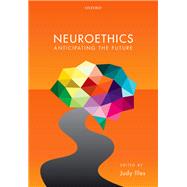
Neuroethics
by Judy IllesRent Textbook
Rent Digital
New Textbook
We're Sorry
Sold Out
Used Textbook
We're Sorry
Sold Out
Author Biography
Judy Illes, Professor of Neurology, Canada Research Chair in Neuroethics, and Director of the National Core for Neuroethics, University of British Columbia
Dr. Judy Illes is a pioneer and a global leader in the field of neuroethics. As a neuroscientist turned neuroscientist-neuroethicist, she has made groundbreaking contributions to ethical, social, and policy challenges at the intersection of biomedical ethics and neuroscience. Her seminal contributions to tackling challenges in neuroimaging, neurodevelopment and aging, addiction and mental health, regenerative medicine, cross-cultural studies, and the commercialization of health care, have had a transformative impact in the way that research is designed and executed, and results and new knowledge shared with the public and decision-makers. She is President of the International Neuroethics Society, a member of the Standing Committee on Ethics for the Canadian Institutes of Health Research, and internationally recognized author, collaborator, and mentor.
Table of Contents
I. Neurotechnology: Today and Tomorrow
1. When Emerging Biomedical Technologies Converge or Collide, Debra J.H. Mathews
2. Emerging Neuroimaging Technologies: Towards Future Personalized Diagnostics, Prognosis, Targeted Intervention and Ethical Challenges, Urs Ribary, Alex L. Mackay, Alex Rauscher, Christine M. Tipper, Deborah E. Giaschi, Todd S. Woodward, Vesna Sossi, Sam M. Doesburg, Lawrence M. Ward, Anthony Herdman, Ghassan Hamarneh, Brian G. Booth, and Alexander Moiseev
3. Incidental Findings: Current Ethical Debates and Future Challenges in Advanced Neuroimaging, Lorna M. Gibson, Cathie L.M. Sudlow, Joanna M. Wardlaw
4. Vulnerability, Youth and Homelessness: Ethical Considerations on the Roles of Technology in the Lives of Adolescents and Young Adults, Niranjan S. Karnik
5. The Neuroethical Future of Wearable and Mobile Health Technology, Karola V. Kreitmair and Mildred K. Cho
6. Technologies of the Extended Mind, Peter B. Reiner and Saskia K. Nagel
7. Neuromodulation Ethics: Preparing for Brain-computer Interface Medicine, Eran Klein
8. Integrating Ethics into Neurotechnology Research and Development: The USA National Institutes of Health BRAIN Initiative, Khara M. Ramos and Walter J. Koroshetz
II. Neuroethics at the Frontline of Healthcare
9. What Do New Neuroscience Discoveries in Children Mean for Their Open Future?, Cheryl D. Lew
10. Neuroprognostication after Severe Brain Injuryin Children: Science Fiction or Plausible Reality?, Sarah Welsh, Genevieve Dupont-Thibodeau, Matthew P. Kirschen
11. No Pain No Gain: A Neuroethical Place for Hypnosis in Invasive Intervention, Elvira V. Lang
12. Placebo Beyond Controls: The Neuroscience and Ethics of Navigating a New Understanding of Placebo Therapy, Karen S. Rommelfanger
13. Ethical Challenges of Modern Psychiatric Neurosurgery, Sabine Muller
14. At the Crossroads of Civic Engagement and Evidence-Based Medicine: Lessons Learned from the Chronic Cerebrospinal Venous Insufficiency Experience, Shelly Benjaminy and Anthony Traboulsee
15. Ethical Dilemmas in Neurodegenerative Disease: Respecting Patients at the Twilight of Agency, Agnieszka Jaworska
16. Anticipating a Therapeutically Elusive Neurodegenerative Condition: Ethical Considerations for the Preclinical Detection of Alzheimer's Disease, Herve Chneiweiss
17. When Bright Lines Blur: Deconstructing Distinctions Between Disorders of Consciousness, David B. Fischer, Robert D. Truog
18. Brain Death and the Definition of Death, James L. Bernat
III. Social, Legal and Regulatory Frameworks: Lessons of the Past Guide Policy for the Future
19. Minors and Incompetent Adults: A Tale of Two Populations, Vasiliki Rahimzadeh, Karine Senecal, Erika Kleiderman, Bartha M. Knoppers
20. Behavioral and Brain-based Research on Free Moral Agency: Threatening or Empowering?, Eric Racine and Veljko Dubljevi
21. Cognitive Enhancement of Today May Be the Normal of Tomorrow, Fabrice Jotterand
22. Environmental Neuroethics: Setting the Foundations, Laura Y. Cabrera
23. First Nations and Environmental Neuroethics: Perspectives on Brain Health from a World of Change, Jordan Tesluk, Judy Illes, Ralph Matthews
24. The Neurobiology of Addiction as a Window on Voluntary Control of Behavior and Moral Responsibility, Steven E. Hyman
25. Looking to the Future: Clinical and Policy Implications of a Brain Disease Model of Addiction, Adrian Carter and Wayne Hall
26. Concussion, Neuroethics, and Sport: Policies of the Past Do Not Suffice for the Future, Brad Partridge and Wayne Hall
27. Security Threat Versus Aggregated Truths: Ethical Issues in the Use of Neuroscience and Neurotechnology for National Security, Jonathan Moreno, Michael N. Tennison, and James Giordano
28. Communicating About the Brain in the Digital Era, Julie M. Robillard and Emily Wight
29. The Impact of Neuroscience in the Law: How Perceptions of Control and Responsibility Affect the Definition of Disability, Jennifer A. Chandler
30. Neuroethics and Global Mental Health: Establishing a Dialogue, Dan J. Stein and James Giordano
IV. Epilogue
31. Neuroethics and Neurotechnology: Instrumentality and Human Rights, Joseph J. Fins
An electronic version of this book is available through VitalSource.
This book is viewable on PC, Mac, iPhone, iPad, iPod Touch, and most smartphones.
By purchasing, you will be able to view this book online, as well as download it, for the chosen number of days.
Digital License
You are licensing a digital product for a set duration. Durations are set forth in the product description, with "Lifetime" typically meaning five (5) years of online access and permanent download to a supported device. All licenses are non-transferable.
More details can be found here.
A downloadable version of this book is available through the eCampus Reader or compatible Adobe readers.
Applications are available on iOS, Android, PC, Mac, and Windows Mobile platforms.
Please view the compatibility matrix prior to purchase.
